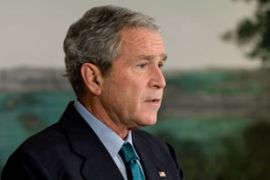Markets climb on hopes of bailout
Asian indices regain some ground as US senate is set to vote on revised rescue plan.

But Song Seng Wun, a regional economist with CIMB-GK Research in Singapore, told warned that a rebound in stock markets was “not really” the best measure of financial health.
Investors were “taking things day by day” and taking their lead from Wall Street, waiting to see whether help was on the way for the US economy, he told Al Jazeera.
Song added that liquidity was still an issue as until there was greater clarity on a financial plan or on the health of the global financial system, financial institutions were essentially “hoarding cash”, lending only to their “most trusted friends”.
Senate to vote
The White House on Tuesday welcomed “the progress made” towards a modified bailout bill – that will include a big increase in the amount of bank deposits protected by the government’s insurance programme – and Wednesday’s scheduled vote in the senate.
| IN DEPTH |
|
Economic analysis of bailout rejection Fighting against US foreclosures |
And Republican and Democratic leaders in the House of Representatives expressed hope the revised bill would pass in that chamber.
A spokesman for John Boehner said the Republican house minority leader “was consulted on [the revised bill] and gave it the green light”.
Boehner “supports it and believes it should pass,” the spokesman said, adding that Boehner believed the additional insurance and taxpayer protections would “appeal to house Republicans”.
Republican house members voted against the rescue package on Monday by a more than 2-to-1 margin. A majority of Democrats voted in favour.
New York’s Dow Jones industrial index closed nearly 500 points higher on Tuesday, offsetting much of the 778 point fall the previous day after the House of Representatives voted against the Bush administration’s plan to bailout the financial sector by 228 votes to 205.
Al Jazeera’s John Terrett reported from New York that the markets were still very volatile, with investors probably betting that there would some sort of bailout plan in the end.
But if they sensed that such a plan would not materialise, the crisis could get much worse, our correspondent warned.
Bailout push
George Bush, the US president, had on Tuesday attempted to reassure taxpayers and the markets, while warning that the House of Representatives’ decision not to pass the bailout bill on Monday would be “painful and lasting” for the economy.
| IN VIDEO | ||
|
“I recognise that this is a difficult vote for members of congress … but the reality is that we are in an urgent situation and the consequences will grow worse each day if we do not act,” he said in a televised address at the White House.
Bush told taxpayers that he understood that many people were concerned about the $700bn cost of the rescue plan, but the cost of not passing the bill would be greater.
“That is a large amount of money … but we are also dealing with a large problem, to put that in context the drop in the stock market yesterday represented more than $1 trillion in losses,” he said.
He also said that he expected much of the money used to buy up the bad debts would be made back once they were sold as the market recovered.
“It is likely that many of the assets would go up in value over time, much, if not all, of the tax dollars invested over time would be paid back,” he said.
Rebel Republicans
Monday’s rejection of the bill was seen as an embarrassing loss for the Bush administration, especially since it had been handed to the president mostly by the hands of members of his own party who do not want an increase in government spending and do not believe in any government intervention in the economy.
|
“I recognise that this is a difficult vote for members of congress … but the reality is that we are in an urgent situation and the consequences will grow worse each day if we do not act” George Bush, |
The president on Tuesday appealed directly to those Republicans to get behind the deal.
“Our country is not facing a choice between government action and the smooth functioning of the free market. We’re facing a choice between action and the real prospect of economic hardship for millions of Americans,” he said.
But Tom Price, a Republican who voted against the bailout plan on Monday, said he thought “it’s important to get this vote right, not necessarily to get it quick”.
“We are principled in the fact that we believe we ought to stick to American principles, we ought to protect the taxpayer, we need to make sure that private money, private equity can get involved and have Wall Street bail out Wall Street, not on the backs of the taxpayers,” he said on NBC television.
Marcy Kaptur, a Democratic Representative, said “we have to look for something that will make the markets function in the way that they should, not reward bad behaviour”.
But David Buick from BCG Partners in London, told Al Jazeera that now was the time for pragmatism, not recriminations.
“The fact is we have a problem and I don’t think that those people who voted against it know the implications,” he said.
“The banking sector is the lifeline, the best artery … to the fabric of every society in the world. Without strong banks we have nothing, we have a dilapidated economy worldwide, we have no retail, we have unemployment, we have anarchy.”

